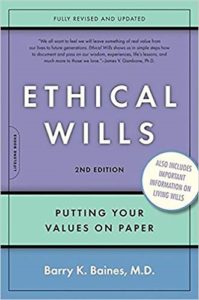Over the holidays, consider writing an ethical will for those you love.
If you are like me, this month will be busy for you. At my house, we are buying gifts, mailing holiday cards, preparing our home for guests, decorating, and grocery shopping. My wife, Kerry, and I are also busy keeping up with our jobs, taking care of our two girls (and another one on the way!), and Kerry is finishing up a doctorate degree.
Being busy makes life go by fast. Years seem like weeks. Kids grow up too quickly.
The end of the year can be a time for reflection. Much has happened over the preceding 12 months. We are different now than we were a year ago. We’ve grown and become wiser. Our outlook on life and our values have changed. We have new plans.
 A friend of mine in the investment community here in Jacksonville, John Thompson, gave me a book earlier this year that taught me about ethical wills. The book is called Ethical Wills, by Barry K. Baines, M.D.
The author of the book states that ethical wills are “…an ancient tradition for passing on personal values, beliefs, blessings, and advice to future generations.”
He writes:
A friend of mine in the investment community here in Jacksonville, John Thompson, gave me a book earlier this year that taught me about ethical wills. The book is called Ethical Wills, by Barry K. Baines, M.D.
The author of the book states that ethical wills are “…an ancient tradition for passing on personal values, beliefs, blessings, and advice to future generations.”
He writes:
What if everything suddenly stopped?
In 2018, several young people I know passed away. They had spouses and children. Their loss is both tragic and unfathomable. As their children age, they will probably have questions about the parent they lost. What was important to them? What were their likes and dislikes? What events shaped their life? What advice would they have given them if they were still alive? If something unfortunate were to happen to you right now, would you be comfortable that your loved ones know your thoughts on things that are important to you? Have you communicated what is meaningful in your life to your family and your community? Are you sure that they know your thoughts on life’s most important topics? A friend of mine in the investment community here in Jacksonville, John Thompson, gave me a book earlier this year that taught me about ethical wills. The book is called Ethical Wills, by Barry K. Baines, M.D.
The author of the book states that ethical wills are “…an ancient tradition for passing on personal values, beliefs, blessings, and advice to future generations.”
He writes:
A friend of mine in the investment community here in Jacksonville, John Thompson, gave me a book earlier this year that taught me about ethical wills. The book is called Ethical Wills, by Barry K. Baines, M.D.
The author of the book states that ethical wills are “…an ancient tradition for passing on personal values, beliefs, blessings, and advice to future generations.”
He writes:
“At turning points in our lives, many of us ask ourselves questions of the heart and soul. Have I fulfilled my purpose? What will I be remembered for? What kinds of legacy have I passed along to my family and others?”Ethical wills can be found throughout the bible. In Genesis 49:1-33, Jacob speaks to his family, giving his thoughts on them and their future. In the book of Matthew 5:1-48, Jesus shares his teachings about the Kingdom of God. On page 10 of Baines’s book, he points to an example of an ethical will in the writings of Shakespeare:
“Give every man thy ear, but few thy voice, Take each man’s censure, but reserve thy judgement… Neither a borrower nor a lender (be), For (loan) oft loses both itself and friend… This above all: to thine own self be true, And it must follow, as the night the day, Thou canst not then be false to any man.” – Polonius to his son, Laertes, from The Tragedy of Hamlet, Prince of Denmark, William Shakespeare
Today, people often write ethical wills as a letter to their loved ones. Sometimes, it is written when someone is sick, and they know they are going to die. However, some people write them to their loved ones for other reasons. This letter can be given to your loved ones now, while you are living.
What is in an ethical will? Here is Baines’s list:
Common themes from the past:- Meaningful personal or family stories
- Lessons learned from personal or familial experience
- Regrets
- Personal values and beliefs
- Values and beliefs of the author’s faith community
- Expressions of love and gratitude
- Apologies
- Blessing, dreams, and hopes for present and future generations
- Advice and guidance
- Requests
- Funeral plans


